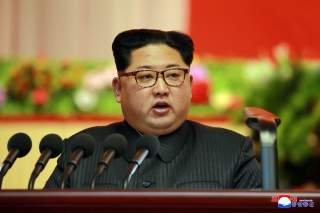Why North Korea’s Charm Offensive Won’t Last
Once again, North Korea is attempting to use the games for their ends.
In the run-up to the 1988 Summer Games in Seoul, North Korea bombed South Korea Air Flight 858, killing 115 people. Afterward, when South Korea remained steadfast in its desire to host the games, North Korea suddenly offered high-level talks. North Korea toned down its rhetoric and tried to negotiate a co-hosting of the Olympics, but this effort fell apart. This historical lesson is corroborated by one of the Flight 585 bombers who was caught and turned. She is still alive today and recently warned not to trust North Korea’s current dictator Kim Jong-un’s outreach.
The 2018 Winter Olympics in Pyeongchang, South Korea is well underway and once again North Korea is attempting to use the games for their ends. North Korea is trying to steal international attention, break sanctions, and drive a wedge between the United States and South Korea.
Kim has already made himself take center-stage, using a dramatic opening to South Korea to force the international spotlight onto himself. Right now, cooperation is his chosen tool of persuasion, as he spoke of reunification, restarted the North Korean-South Korean hotline, and worked to convince South Korea that both Olympic teams should march under one neutral flag. Kim also launched a charm offensive to show he is serious about negotiations. This has included toned-down rhetoric, a smaller military parade, and sending flashy bands to perform at the Olympics. He also sent North Korean pop star and propagandist Hyon Song-wol to find a venue for an orchestra, causing a sensation which bedazzled South Korean journalists and citizens.
Recommended: America’s Battleships Went to War Against North Korea
Recommended: 5 Places World War III Could Start in 2018
Recommended: How North Korea Could Start a War
In the background of all this distraction, North Korea is preparing to make a show of force. Satellite imagery showed 13,000 troops and 150 vehicles drilling for the small February 8th military parade that featured a new missile system. Kim knows he can have a larger parade to send a message anytime he wants. It remains to be seen if he will engage in any missile or nuclear tests during or right after the Olympics.
North Korea’s appearance of reconciliation also purposefully includes sanctions violations. One of these sending senior North Korean officials to visit South Korea despite being banned from traveling. South Korea will have to decide if it wants to make an exception to the ban, but without certain waivers from the United Nations Security Council, such visits would violate the law. Meanwhile, it is unclear how the US would respond. Already Kim’s less notorious sister, Kim Yo-jong, who is not barred from visiting, has had a successful time charming the South Korean and American media.
Kim will likely get away with several sanctions violations because he will extract them as the cost of North Korean cooperation. Even if they are minor, these violations will test the limits of what others will tolerate. They will make the point that North Korea always has been––and always will be––able to do as it pleases.
Finally, Kim would love to see the South Korean-American alliance rendered a dead letter. Although it is a very unlikely goal, Kim attempts to accomplish this by contrasting South Korea’s willingness to talk with the bellicosity of US President Trump. North Korea’s aim is to create the perception that the Koreas are working together against interference by America. When North Korea returns to aggression, Kim will claim that it is America’s fault. By cozying up to South Korea and then walking out, Kim hopes to drive a small wedge into the alliance.
South Korea should talk to Kim, and so should America, mainly to lower the odds of accidental war. However, talks require realizing that nuclear weapons will not be up for serious discussion and that North Korea will continue its pattern of behavior. Sudden shifts to threats place pressure on South Korea and shifts to friendliness invite confused opponents to the bargaining table on Kim’s terms. Wise policymakers anticipate this pattern, rather than being angered or duped by it. To take Kim Jong-un’s overtures at face-value is foolish, and South Korea should assume that the Supreme Leader is after something more than the gold at these Olympics.
John Dale Grover is a Young Voices Advocate and a graduate student at George Mason University’s School of Conflict Analysis and Resolution. His articles have appeared in Forbes, the National Interest, and Real Clear Defense. Follow him on Twitter @JohnDaleGrover.
This article originally appeared on Real Clear Defense.
Image: Reuters

